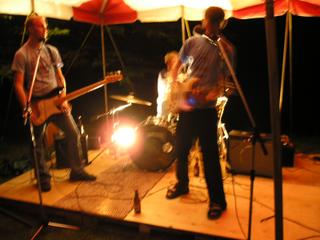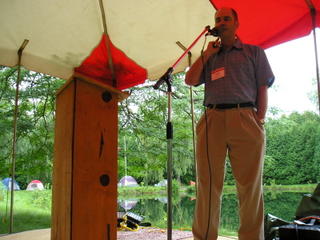Cannabis Health reprints Rockwell piece
That piece is reprinted in the most recent edition of Cannabis Health magazine, which you can view here.

Yeah, that's my family--the Polish immigrants--and David did end up buck in his tent as subsequent trips to ensure he wasn't still ill from the drinking confirmed (Ben Talley was the responsible chap who patrolled the area to ensure everyone who wasn't sober--which was basically everyone--was fine and having a good time. Good on you, Ben!)"Recently in Canada, we were pretty crazy 'cause we were with some Polish immigrants," he says. "We drank a drink called Old Krupnik.
"It's Polish honey-liquor. It goes down like water. Basically, in short, I ended up drinking about an entire bottle by myself."
DeSousa says David's indisposed state that night led to some "equipment mishaps.""He ended up naked in the tent," DeSousa says.
"We also broke a snare drum stand at that show and we left all of our stuff out in the rain, including stuff that didn't belong to us."
If you want more DJ Dad and MC Mom (and how could you not?) you can download my two favourite songs here and here, or go to their MYSpace website and listen to some more tunes.Tim says the main reason the band recently visited Canada was to promote Bureaucrash.com, an activist group that he and brother David are involved in.
"We are the state coordinators and we were asked to play at an event called Liberty Summer Seminar," Tim says.
"And it's one of the many liberty-minded events we're going to be playing at shortly.
"We're kind of the staple band for them.
"It's primarily made up of, at least in America, libertarians -- people who support social and economic freedom. For instance, we are capitalists, we're against the drug war ... just minimal government."
National Public Radio has an interesting piece on the Lost Liberty Hotel, a story I wrote about for the Western Standard. You can read that story, entitled Check your Property Rights at the door, to get a good sense of what that project is about. Then you can get some t-shirts (H/t Jamie T. for the link). Here's how my story starts:
How many of you would want to spend the night at a place called the Lost Liberty Hotel? With a name like that, you'd think the accommodations might be a bit, well, restrictive. But Logan Darrow Clements, the man behind the plan to build the Lost Liberty, insists the hotel will be a big tourist draw--as a monument to the loss of property rights in America.
Once it's built, that is. Before that can happen, Clements will have to get the town of Weare, N.H., to expropriate the house that sits on his planned location--34 Cilley Hill Road, the home of U.S. Supreme Court Justice David Souter. That shouldn't be too hard, thanks to a little help from Souter himself. On June 23, he was one of five judges who ruled in a landmark decision that destroyed the constitutional guarantee of property rights. Now, if Clements demonstrates that Weare is better off with a hotel at 34 Cilley Hill than a house, there's no longer anything stopping them from tossing Souter out. And with plans for amenities, such as the Just Desserts Café and a museum dedicated to the loss of liberty in America, how could they resist.




Alberta moving ahead on private health care Supreme Court ruling shows that province has a moral responsibility to act, says Ralph Klein
A few years ago, a man from Quebec asked a very sensible question: "Why can't I buy the health care I need when I am in pain?" It was a question many defenders of the status quo didn't want him to ask and, indeed, fought him every step of the way as his question meandered through Canada's justice system.
Last month, Canada's Supreme Court answered his question. They said, in effect, if you are in pain or suffering, and your right to a healthy life is in jeopardy, you should be able to buy the health care you need and prohibitions on doing so violate your fundamental rights as a Canadian.In rendering its judgment, the Supreme Court also took special care to demolish the myths that the defenders of the status quo have been telling Canadians for years. The people resistant to change in Canada's health-care system have maintained for years that an increase in the choice Canadians have in getting their health care would destroy our health-care system.
Said the court: "for each threat mentioned, no study was produced ..." And further "witnesses ... should be able to cite specific facts in support of their conclusions." Finally, "The experts ... do not appear to be very convincing."
In other words, the hollow rhetoric and pointless scaremongering are over.An Alberta Justice analysis of the court's decision found: "The evidence demonstrates that a monopoly is not necessary — or even related — to the provision of quality public health care." Case closed.
So, with the myths destroyed, where do we go from here? That is what the 62 Progressive Conservative members of the legislature met to debate recently in Edmonton.
There can be little doubt that the Supreme Court decision has forever changed our ealth-care landscape. The challenge is to embrace the change — not to run from it —and look at the ruling as an opportunity, not a threat.
Let me be blunt. We have unacceptable waiting lists in our publicly funded, rationed health-care system, and all the money in the world is not going to eliminate them.
We spend more than $9 billion a year in Alberta on health care, and it increases year after year, and the waiting lists remain. Rationing creates waiting lists, whether it is bread, gasoline or health care. The answer is not more money; the answer is more choice.
Choice can be found in a supplementary insurance plan to privately fund non-emergency medical services, with the exception of mental health and clinical psychology.
In simple terms, it means that if you are in pain or suffering and cannot wait in line, you should be able to buy the health care you need.
The Supreme Court has ruled that governments cannot deny you this right. Not jump the line, but move out of the line. Move out of the publicly funded health-care system and into an expanded parallel system that has more capacity to end your pain and suffering, but to do so at your own cost.
After all, our outstanding public education system works in tandem with a parallel private education system, and we have the smartest kids in Canada. The publicly funded health-care system will always be there for those who need quality health care when they need it, but it will operate under far less pressure, and will be a better system because of it.
(Alberta) Minister of Health and Wellness Iris Evans and her outstanding team are working on the details, but the premise is simple: You have a constitutional right to be, and stay, healthy.As the court so aptly noted, access to a waiting list is not access to health care.
I know change is not easy. But I also know the status quo can be far more dangerous. My government has often not agreed with the rulings of the Supreme Court of Canada, but we have accepted them and adapted to whatever changes they created. So it is with health care.
The Supreme Court has confirmed that the delivery of health care is a provincial responsibility and that barriers to access, whatever they may be, deny Canadians a fundamental right.
The Alberta government is moving swiftly to remove those barriers to accessing health care, not just because it is a legal requirement, but because it is a moral responsibility.
SUPREME COURT OF CANADA -- JUDGMENT IN APPLICATION FOR A RE-HEARING OTTAWA, 2005-08-04-09:45EDT. THE SUPREME COURT OF CANADA HAS TODAY DEPOSITED WITH THE REGISTRAR JUDGMENT IN THE FOLLOWING APPLICATION FOR A RE-HEARING.
FROM: SUPREME COURT OF CANADA (613) 995-4330
29272 Jacques Chaoulli et George Zeliotis c. Procureur général du Québec et Procureur général du Canada (Qc) Coram: McLachlin C.J. and Major,
Bastarache, Binnie, LeBel, Deschamps and Fish JJ.The motion for a partial rehearing is granted. The Court’s judgment is stayed for a period of 12 months from the date such judgment was issued, namely June 9, 2005.
It is because of his long career of activism that the DEA is targeting him. Unlike other seed merchants who quietly conduct their affairs, Emery puts the brunt of his efforts into the movement to end the prohibition of marijuana and to legitimate the culture that has emerged surrounding the plant.
Since the prohibition of drugs is a multi-billion dollar affair, we shouldn't be surprised. Drug cops, prosecutors, judges, politicians, prison construction contractors, companies that use cheap prison labour, and military firms that sell weapons and surveillance equipment to drug law enforcement are all significantly enriched by the continuation of the war on drugs.
Further, those participating in the drug war share a common assumption about members of the marijuana culture. They all believe that marijuana people are second-class citizens who deserve to be vilified. Their views are best expressed in U.S. Drug Czar John Walter's statement that Vancouver's marijuana scene is "moral pollution."
In the public policy sphere, the assumptions of the drug warriors are the rule. With very few exceptions, all politicians operate on the assumption that there is something inherently wrong with using and growing marijuana.
But such views are in direct contradiction with society's values. Consider Cheech and Chong movies, the Simpsons, South Park, late-night talk shows, and the stories most of us have about our own experiences with marijuana. These all involve the implicit understanding that smoking marijuana is innocent, largely harmless, and fun.
We're right to think that.